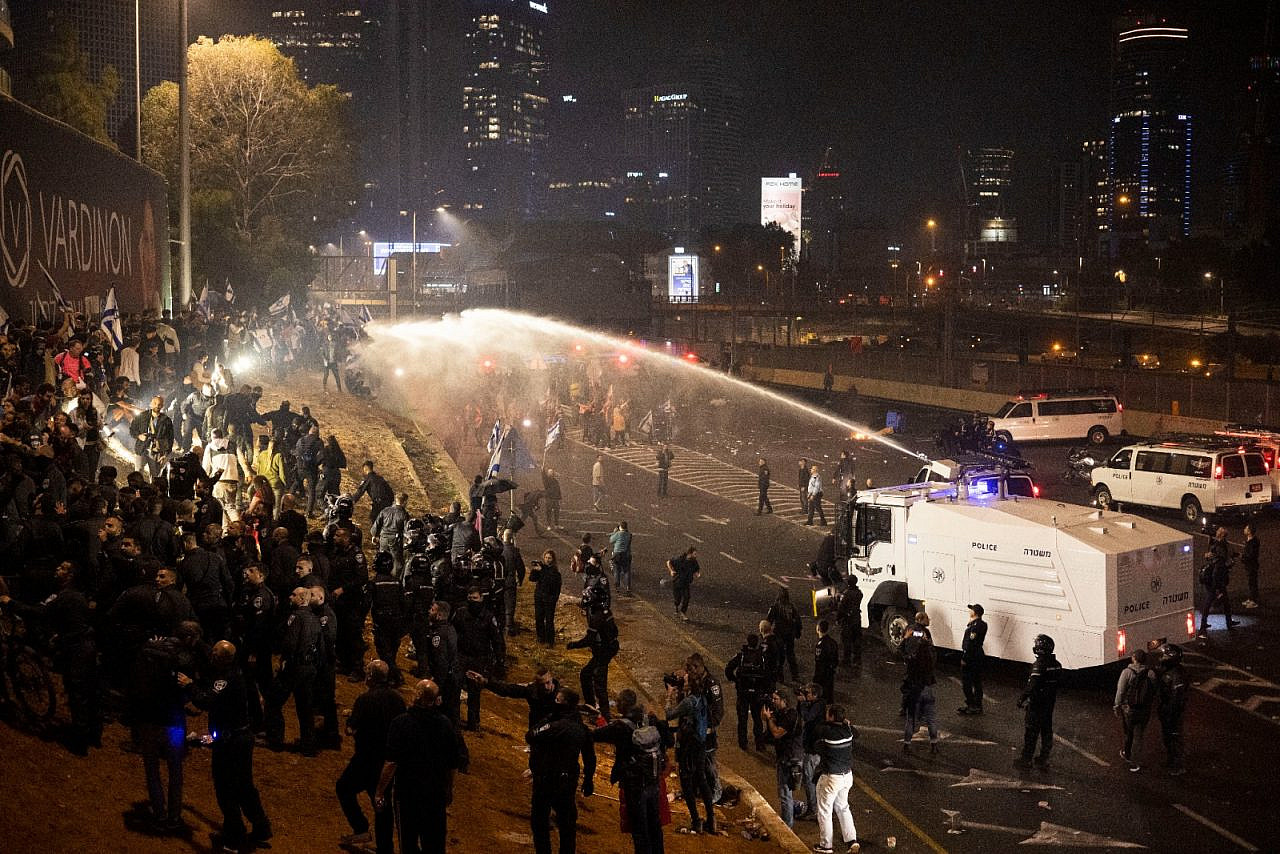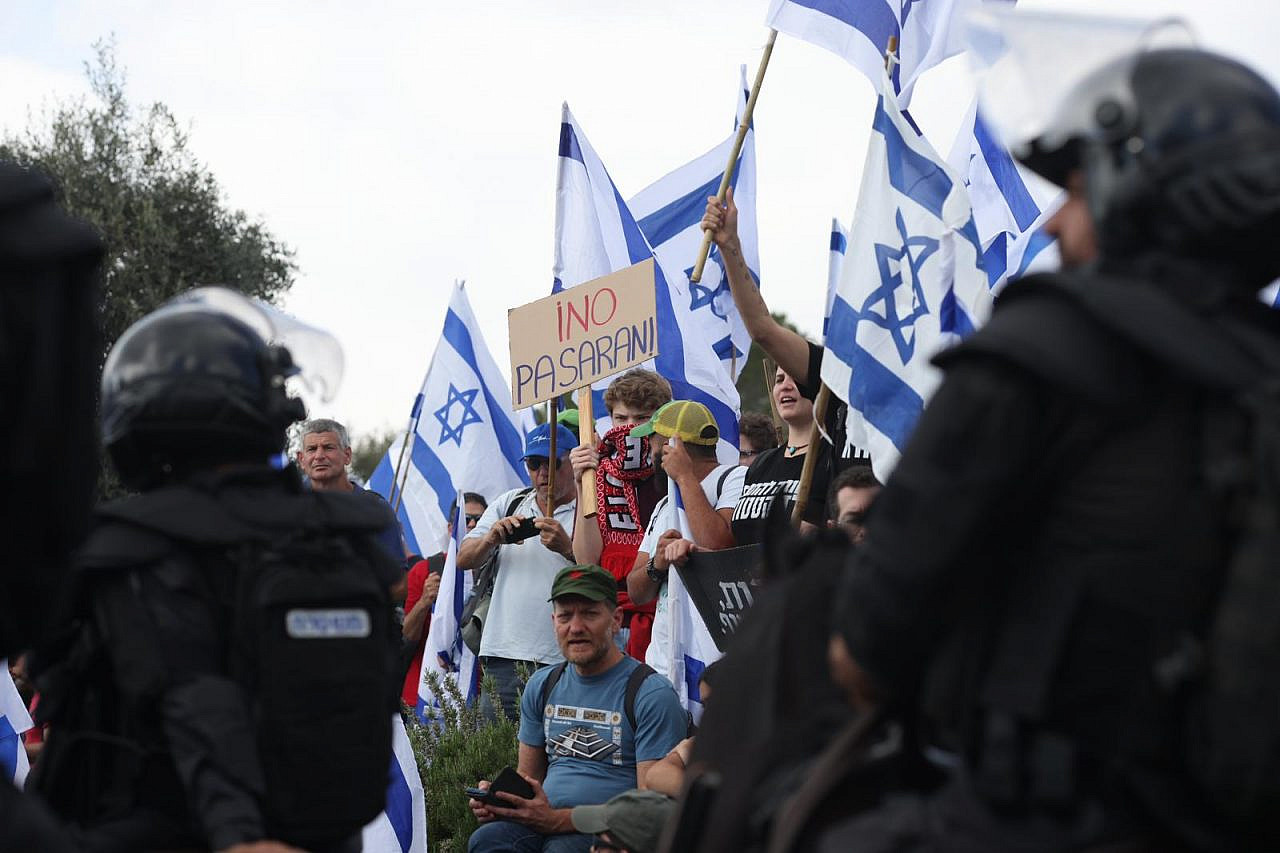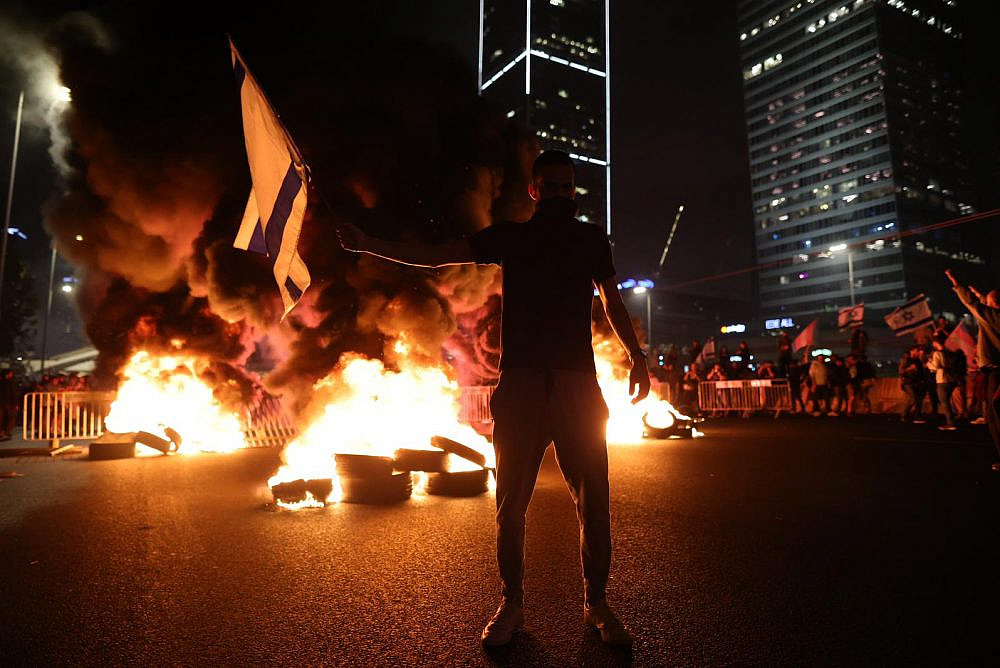After 13 weeks of fiery, unprecedented public protests, Sunday night and Monday morning brought with them historic developments: not only a continued escalation in the demonstrations themselves, but also the announcement of a general strike by Israel’s powerful labor union; additional strikes by the country’s universities; and shutdowns at Israeli embassies around the world. Those scenes, coupled with a potential announcement by Prime Minister Benjamin Netanyahu that he is putting his judicial coup on pause, have given Monday’s protests — especially those outside the Knesset in Jerusalem — a different atmosphere: less fear and rage, and more a rare sense of achievement. And rightly so.
The fact that the protests might succeed at putting on hold the judicial coup, if not preventing it entirely, is a critical moment for Israeli civil society. The knowledge that such a large public is rightfully revolting against their rights being threatened greatly strengthens the very idea of democracy.
On the other hand, it is difficult to ignore the sense of déjà vu accompanying these protests. Less than two years ago, an entire political camp celebrated the fall of the Netanyahu government, after weeks of protests that went on almost as long as the current wave of demonstrations. Then, too, the protests were united by being against something — the Netanyahu regime — as opposed to being for something. And then, as now, the protesters believed the very character of the state to be at stake.
But the most critical point of all is the protesters’ understanding of the term “democracy” — an idea they have so intensely mobilized around. In both the so-called Balfour protests and the current ones against the judicial coup, democracy was a central demand; only a limited, albeit persistent, group of anti-occupation demonstrators sought to emphasize the connections between the violation of Palestinian rights in the occupied territories and Israel’s ability to maintain a democratic regime.

During the Balfour protests, +972’s Oren Ziv spoke with a range of protesters who vowed that the toppling of the Netanyahu regime would only be the beginning. After that, they said, they would get to work on society’s other ills and bring justice to areas where it was lacking. Even once Netanyahu was gone, they would not stop, they said. But they did stop.
Thanks to the efforts of anti-occupation protesters at the Balfour demonstrations, a meaningful number of people were exposed for the first time to the injustices of the occupation and began to take an interest in the issue; some of them even became committed activists who attend protests and continue to accompany Palestinian shepherds in the occupied West Bank to this day. But on the whole, after Netanyahu’s ouster, the crowds that had taken to the streets went home, and welcomed the “government of change,” which was formed shortly after, with a profound sense of relief.
Because those protests, from the start, united around getting rid of Netanyahu and stopped short of defining their desired alternative, the fact that this hybrid coalition brought together veteran opponents of the occupation, such as Mossi Raz and Gaby Lasky, and far-right hawks such as Naftali Bennett and Avigdor Liberman, was seen as a victory. That same government, which oversaw a doubling in the rate of home demolitions in occupied East Jerusalem, and which was responsible for the deadliest year for West Bank Palestinians in almost two decades, ultimately sacrificed itself on the altar of preserving apartheid rule in the occupied territories.
All of this is not to rain on the parade of the hundreds of thousands of demonstrators who have taken to the streets over the past few months, nor to call into question the significance of the protest movement. The point is to remind those protesters that the Israeli reality demands a foundational change that goes far deeper than merely preventing the judicial coup, evil as it is. In fact, this government is planning to pass laws and policies that will harm the most vulnerable groups: expanding the authority of the rabbinical courts; severe cuts to public housing; further privatization of the education system; getting rid of the Public Broadcasting Corporation, and many others. We cannot look away as these come to pass.

But the change we need goes beyond this government’s ignoble plans. The protest movement has brought with it an opportunity to have a conversation about the most basic axioms upon which Israeli society was founded and which continue to animate it over seven decades later. Even if Netanyahu announces that he is temporarily freezing the judicial coup — and even if he goes as far as annulling it entirely — our self-examination will only have just begun, and the questions we will have to answer will be profound.
If we fail to understand how we reached this point, we are condemning ourselves to reaching the exact same situation in the future — not unlike what occurred following the Balfour protests. If we do not honestly ask ourselves where Palestinian citizens were during the mass demonstrations or about the role of nationalist and militaristic language in the protest — which may have been successful on the tactical level, but further deepened the chasm between Palestinian and Jewish citizens — we will not succeed in formulating a true democracy that must include all citizens.
If we continue to concentrate only on the procedural aspects of democracy, such as the composition of Knesset committees, or the demand for the establishment of a constitution while ignoring the contents of such a document — such as true equality, freedom and justice — we will once again be left with a thin and hollow shell of democracy. If we refuse to understand in this very moment that democracy cannot, by definition, coexist alongside a regime of occupation, apartheid, and supremacy, not only will we inevitably find ourselves again struggling against a dictatorship, but next time, that dictatorship will be far more violent and uninhibited.
This article was originally published in Hebrew on Local Call. Read it here.



